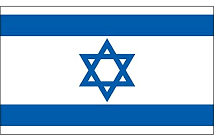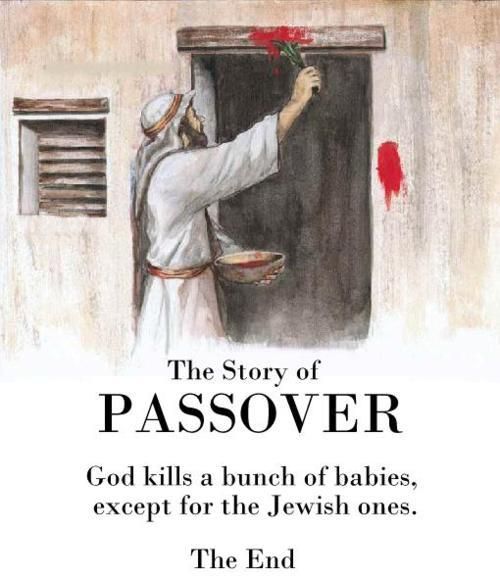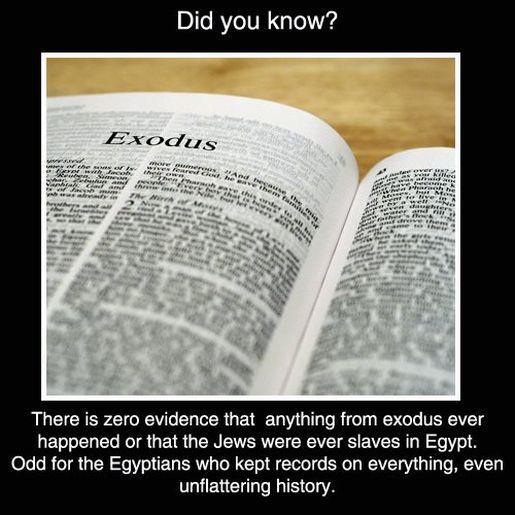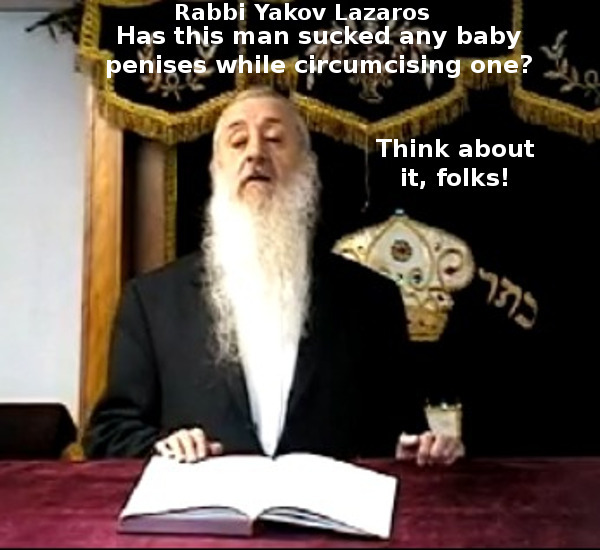|
Imagine these hateful jews celebrating a genocide, just like
Noah's Ark.
Passover is one of those events Jews celebrate because the story line says that God killed all the first born children in Egypt except the jewish babies. I'm surprised these idiots don't have another day of celebration for the story of Noah's Ark, where God kills all but eight people on the planet. The jewish god, Yahweh seems as irrational as the muslim god, Allah! The idiot jews should also celebrate their own alleged genocide (the Holocaust) on April 20. Adolf Hitler's birthday. In the narrative of the Exodus, the Bible tells that God inflicted ten plagues upon the Egyptians before Pharaoh would release his Hebrew slaves, with the tenth plague being the killing of every firstborn male, from the Pharaoh's son to the firstborn of the dungeon captive, to the firstborn of cattle. The Hebrews were instructed to mark the doorposts of their homes with the blood of a spring lamb and, upon seeing this, the spirit of the Lord passed over these homes, hence the term "passover". When Pharaoh freed the Hebrews, it is said that they left in such a hurry that they could not wait for bread to rise. In commemoration, for the duration of Passover no leavened bread is eaten, for which reason it is called "The Festival of the Unleavened Bread". Matzo (flat unleavened bread) is the primary symbol of the holiday.

Were Jews ever really slaves in Egypt, or is Passover a myth?
One of the biggest events of the Jewish calendar is predicated upon reminding the next generation every year of how the Egyptians were their cruel slave-masters, in a bondage that never happened. The reality is that there is no evidence whatsoever that the Jews were ever enslaved in Egypt. Yes, there's the story contained within the bible itself, but that's not a remotely historically admissible source. I'm talking about real proof; archeological evidence, state records and primary sources. Of these, nothing exists. Since the Exodus never occured, we can conclude that the following events never occured:
It is hard to believe that 600,000 families (which would mean about two million people) crossed the entire Sinai without leaving one shard of pottery (the archeologist's best friend) with Hebrew writing on it. It is remarkable that Egyptian records make no mention of the sudden migration of what would have been nearly a quarter of their population, nor has any evidence been found for any of the expected effects of such an exodus; such as economic downturn or labor shortages. Furthermore, there is no evidence in Israel that shows a sudden influx of people from another culture at that time. No rapid departure from traditional pottery has been seen, no record or story of a surge in population.

One would think that after wandering around the Sinai peninsula for forty years without GPS, Moses and his mob would have left something in the sand for archeologists. An estimated two million died in forty years but no graves, pottery or broken equipment is found to support the possible existence of two million people wandering around. The destination of the Exodus was the land of Canaan, the promised land. At the time of the Exodus, Egyptian power extended to the Greecian islands. The Sinai and land of Canaan was under Egyptian control at the time and there is no Egyptian documentation of any such mass migration. The funny part of passover is that Yahweh could identify you as a jew only if you were circumcised. Yes, Yahweh was a penis inspector.

In Exodus we have an account of the manner in which Jehovah delivered the Jews from Egyptian bondage. We now know that the jews were never enslaved by the Egyptians: that the entire story is a fiction. We know this because there is not found in Hebrew a word of Egyptian origin, and there is not found in the language of the Egyptians a word of Hebrew origin. This being so, we know that the Hebrews and Egyptians could not have lived together for hundreds of years. As the Passover myth is discredited over time, the jews are busy replacing it with the the Holocaust Religion . They just have to maintain the illusion that they are victims.
|
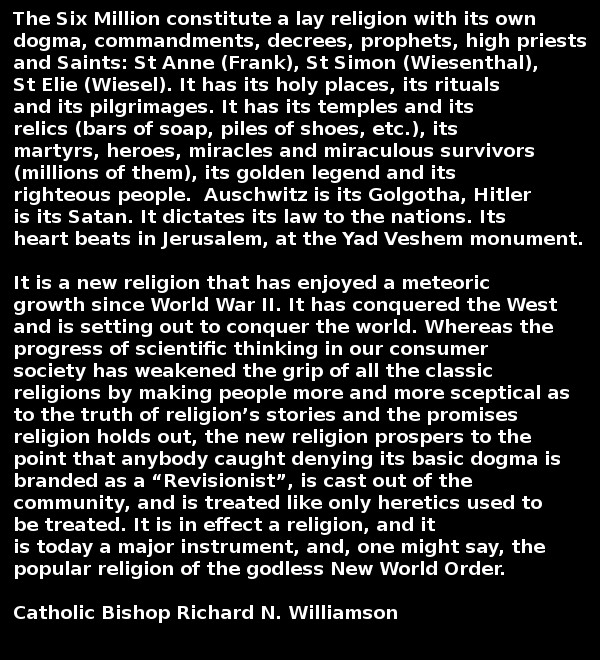
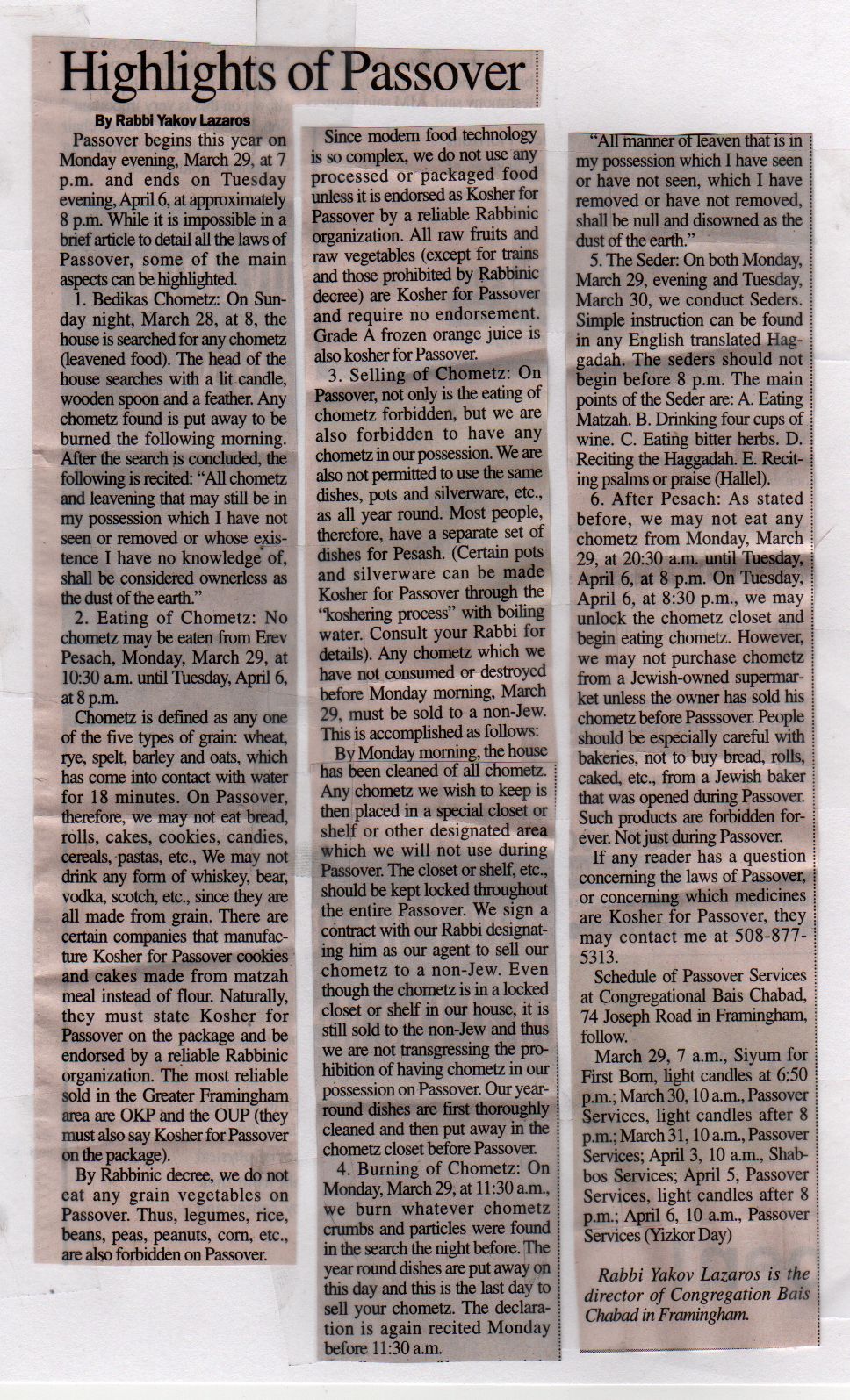
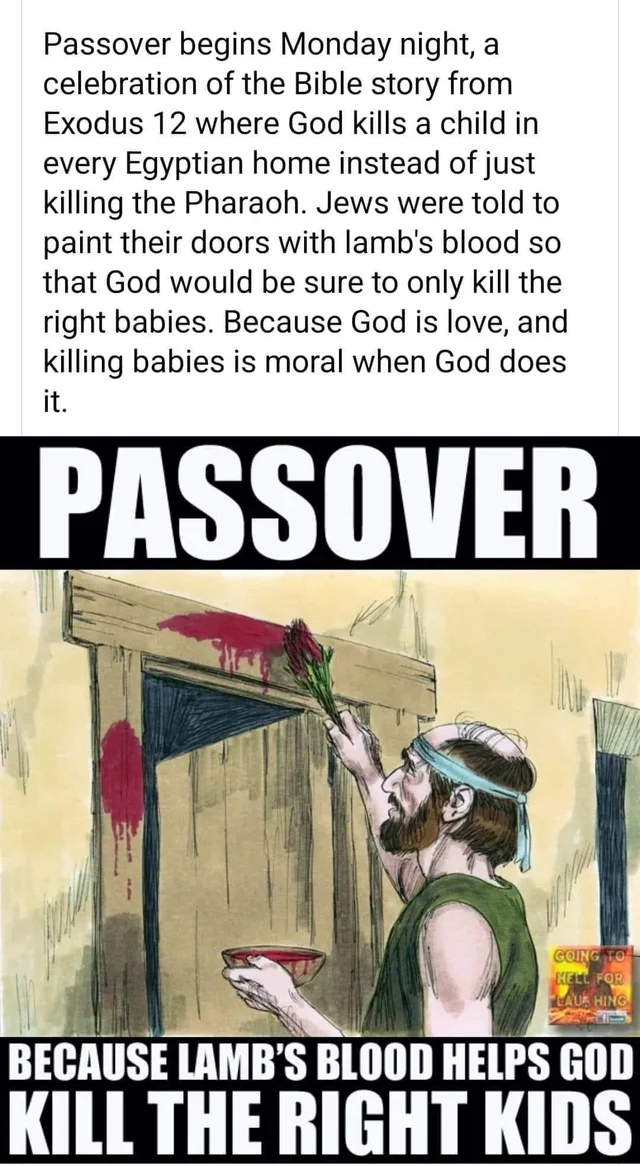
|
Highlights of Passover
By Rabbi Yakov Lazaros Passover begins this year on Monday evening, March 29, at 7 p.m. and ends on Tuesday evening, April 6, at approximately 8p.m. While it is impossible in a brief article to detail all the laws of Passover, some of the main aspects can be highlighted.
If any reader has a question concerning the laws of Passover, or concerning which medicines are Kosher for Passover, they may contact me at 508-877-5313. Schedule of Passover Services at Congregational Bais Chabad, 74 Joseph Road in Framingham, follow, March 29, 7 a.m., Siyum for First Born, light candles at 6:50 p.m; March 30, 10a.m, Passover Services, light candles after 8 p.an; March 31, 10 a.m., Passover Services; April 3, 10 am, Shabbos Services; April 5, Passover Services, light candles after 8 p.m.; April 6, 10. a.m., Passover Services (Yizkor Day) Rabbi Yakov Lazaros is the director of Congregation Bais Chabad in Framingham.
Anti-Passover is first and foremost a time of mourning, a remembrance of the horrific punishments visited by the evil Canaanite warlocks, Moses and Aaron, on the innocents of Ancient Egypt. These included devastating plagues and catastrophes, causing widespread famine, and culminated in the most horrendous spell of all, which caused the instant death of Egypt's innocent first-born sons. The Biblical narrative claims that these evil acts were justified by the supposed enslavement of the Hebrews. However, archaeological evidence does not support this self-serving fabrication. Many "slaves" in Egypt were actually immigrant workers, and even actual slaves captured in war were paid and protected from abuse. They often worked side by side with native Egyptian workers, who were similarly enslited to work, or did so voluntarily. Any even if the Hebrews were slaves, it's impossible to justify the scale of the punishment by any moral measure. What did the innocent children of Egypt do to deserve hunger, disease, and death? But Anti-Passover is not just a time of mourning. It is also a celebration of th wonders and achievements of Ancient Egypt, one of the grandest, most enduring, and most influential of human civilizations. We shall gather together and fashion paper hats for ourselves, in the shape of those wondrous pyramids built to accompany Pharaohs and other great leaders to the afterlife. We shall cook and eat delicious foods, primarily pasta, in defiance of the Jewish insistence on avoiding leavened flour. And why not go all-Italian with some antipasti starters? Or shall we call them antipassti? We shall drink heartily of Egyptian barley beer, flavored with dates, honey, and spices. We shall play games together, such as spin-the-pyramid and Questions for the Sphinx. And we shall read out loud from the Book of the Dead, following the allegorical paths traveled by the first-borns after their inexcusable deaths. But also recite from the Litanies of Re and the Eye of Horus, retelling the myths of their exploits both righteous and wrong, as well as those of Isis, Amun, Osiris, Anubis, T'hot, Hat'hor, Bastet, and their fabulous roles in fashioning the cosmos, people, and the course of history. And finally we shall loudly curse the dark magicks of Moses and his cruel demon god, vowing to never again allow humanity to slip into mindless worship of foul entities conjured by cynical charlatans in order to hold sway over our lives. As we end the feast and go back to our individual homes, we shall embrace each other one last time. We shall then solemnly remove our pyramid hats, symbolically "passing over" the past millennia of cruelty, hate, and ignorances fostered by our religious heritage, and walk hopefully into a new dawn of truth and love. |
Send comments to:
 hjw2001@gmail.com
hjw2001@gmail.com
|





